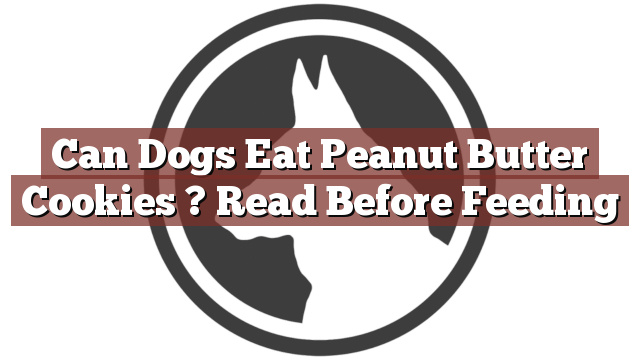Understanding Your Dog’s Dietary Needs
As a responsible dog owner, it is essential to understand your furry friend’s dietary needs. Feeding your dog a balanced and nutritious diet is crucial for their overall health and well-being. While dogs are omnivores and can consume a variety of foods, it is vital to be cautious about what you offer them. Certain human foods can be harmful or even toxic to dogs. Therefore, it is essential to be aware of the potential risks associated with feeding your dog certain foods, including peanut butter cookies.
Can Dogs Eat Peanut Butter Cookies? Read Before Feeding
Can dogs eat peanut butter cookies? This is a common question that many dog owners may have. The answer is no. While peanut butter itself can be a healthy treat for dogs due to its high protein content, most peanut butter cookies contain ingredients that can be harmful to our canine companions.
Peanut butter cookies often contain added sugars, salt, artificial sweeteners, and other ingredients that are not suitable for dogs. These ingredients can cause a range of health issues for our furry friends, including obesity, tooth decay, digestive problems, and even pancreatitis. Additionally, some peanut butter cookies may contain xylitol, a sugar substitute that is highly toxic to dogs. Therefore, it is best to avoid feeding peanut butter cookies to your four-legged friend.
Pros and Cons of Feeding Peanut Butter Cookies to Dogs
While it is clear that feeding peanut butter cookies to dogs is not recommended, let’s take a look at the pros and cons of this practice in more detail.
Pros:
- Peanut butter itself can be a healthy treat for dogs, as it is a good source of protein and healthy fats.
- It can be a useful tool for hiding medication or as a reward during training sessions.
Cons:
- Peanut butter cookies often contain added sugars, salt, and other unhealthy ingredients that can lead to weight gain and other health problems in dogs.
- Xylitol, a common ingredient in some peanut butter cookies, is highly toxic to dogs and can cause life-threatening complications.
It is important to note that if you still want to give your dog a peanut butter treat, it is best to use plain, unsalted peanut butter without any added sugars or artificial sweeteners. However, even in this case, moderation is key, as too much peanut butter can still lead to weight gain and other health issues.
In Conclusion: Weighing the Benefits and Risks
In conclusion, while dogs can enjoy the occasional treat, it is crucial to make informed choices about what we feed them. When it comes to peanut butter cookies, the cons clearly outweigh the pros. The added sugars, salt, artificial sweeteners, and potential inclusion of xylitol make these cookies unsuitable for canine consumption. As responsible pet owners, it is always best to consult with your veterinarian about appropriate treats and stick to a well-balanced, dog-specific diet to ensure your furry friend remains healthy and happy.
Thank you for taking the time to read through our exploration of [page_title]. As every dog lover knows, our furry friends have unique dietary needs and responses, often varying from one canine to another. This is why it's paramount to approach any changes in their diet with caution and knowledge.
Before introducing any new treats or making alterations to your dog's diet based on our insights, it's crucial to consult with a veterinarian about [page_title]. Their expertise ensures that the choices you make are well-suited to your particular pet's health and well-being.
Even seemingly harmless foods can sometimes lead to allergic reactions or digestive issues, which is why monitoring your dog after introducing any new food item is essential.
The content provided here on [page_title] is crafted with care, thorough research, and a genuine love for dogs. Nevertheless, it serves as a general guideline and should not be considered a substitute for professional veterinary advice.
Always prioritize the expert insights of your veterinarian, and remember that the health and happiness of your furry companion come first.
May your journey with your pet continue to be filled with joy, love, and safe culinary adventures. Happy reading, and even happier snacking for your canine friend!

